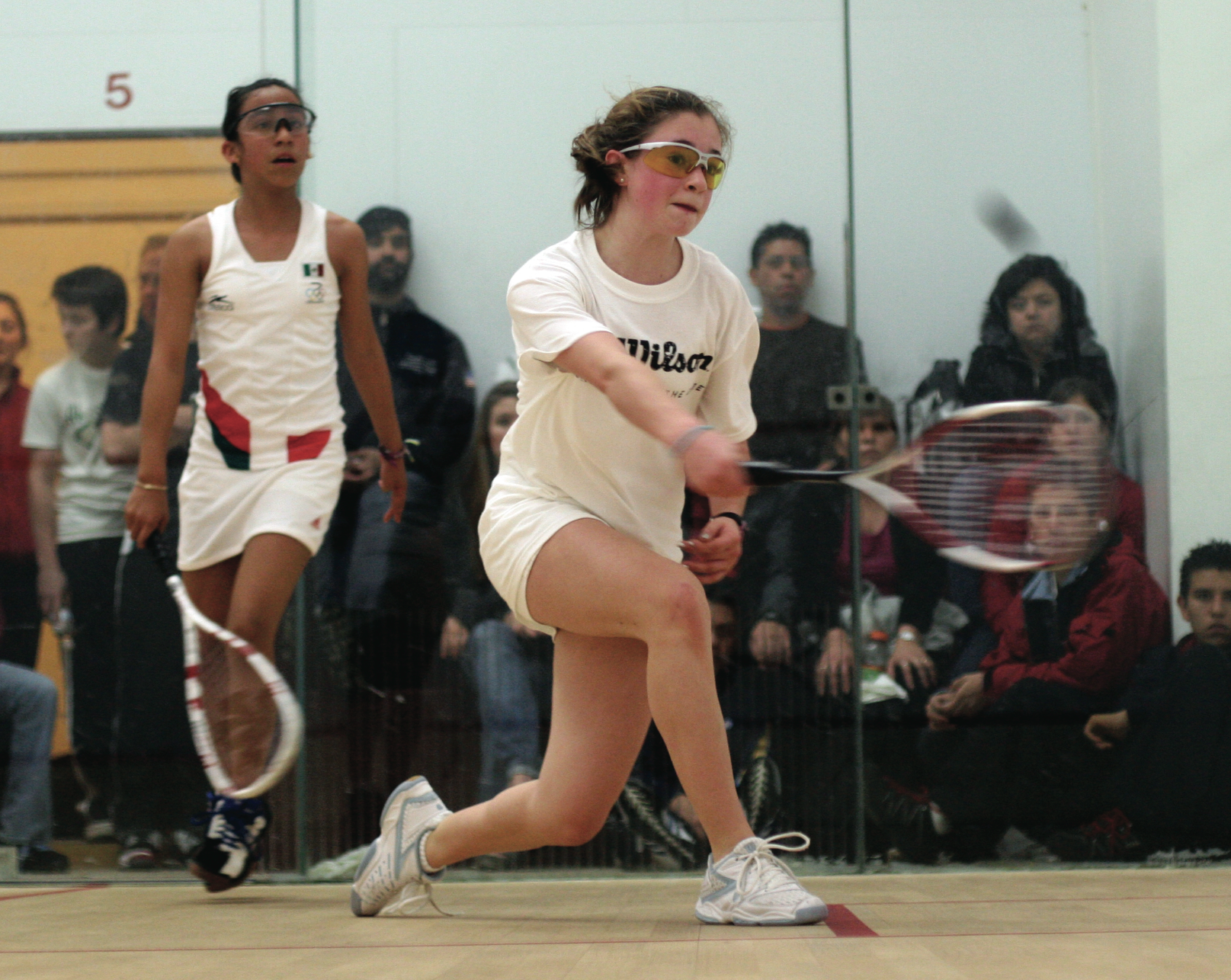By Kirsten Carlson
Photos by Jay D. Prince
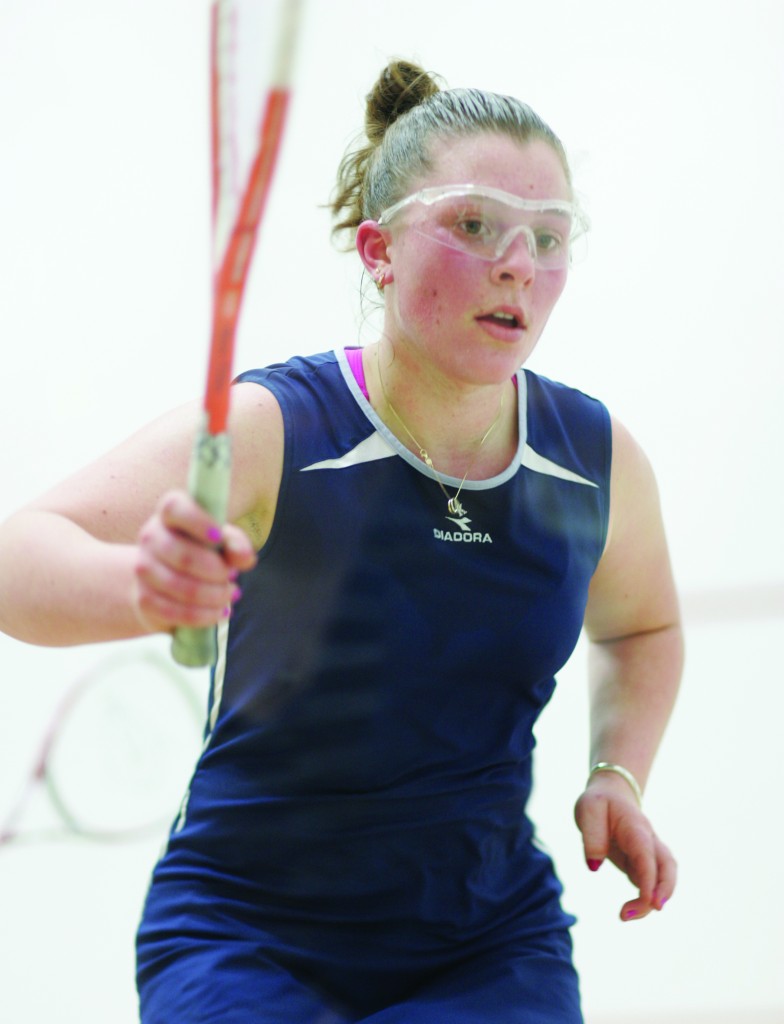
A perfect storm. Defined as a “once in a lifetime storm.” Also used to imply a sequence of events falling into place absolutely perfectly. The Seattle area suffered one of those storms during the days leading up to the US Junior Open. With over one million homes and businesses out of power due to the second worst wind storm in 150 years, including the Pro Sports Club—one of the main venues for the event—Seattle got hammered. The entire tournament was rescheduled for the Seattle Athletic Club, which although at first seemed a bit scattered, ended up resulting in a great community feel and allowed spectators and competitors to see all the matches they wanted too.
But there was another perfect storm at the US Junior Open. Kristen Lange of Woodinville—a suburb 30 minutes outside of Seattle—finished her junior career by winning the GU19 at home.
“I can’t remember who said it, but someone said you started your career here and you ended it here,” Lange said. “And that was kind of the best thing is that I was able to start my career here and end it in front of my mom and dad and all the Khans and all the people who have seen me grow up over the years.”
Lange, now playing No. 1 as a freshman at Penn, has trained with Azam Khan at the Pro Sports Club since she was young. Not only did Lange—who like all of the west coast players is used to traveling east for major tournaments—have her family, friends, and both coaches (Azam Khan and Jack Wyant, Penn Women’s head coach) there to support her, but as a cherry on top, she had an article written about her in the Seattle Post Intelligencer, where she mentioned explaining to people that she does not play with a vegetable, but a racquet and a ball.
The article was written on the heels of Lange’s 3-2 win over Logan Greer who had beaten Lange 3-0 the last time they met in the US Junior Closed nine months earlier. After jumping to a two game lead, Greer scrambled back into the match to force a deciding fifth. But Lange put an abrupt halt to any murmurs about her coming up short by dominating the fifth, 9-0. The next day Lange crushed England’s Deon Saffery—who had won the Canadian Junior Open just days before without dropping a game in the event and who hadn’t been tested in the US Junior Open while sweeping her way to the final. For the record, Lange breezed past Saffery in a mere 30 minutes, 3-0.
Before her match against Saffery, whom she had met previously but had never played, Lange was not intimidated. “Azam spoke to me before the match and said, ‘You didn’t come this far and train so hard to make it to the finals in your hometown and not win.’ And he was right. So I just went out there. It was one of those things.”

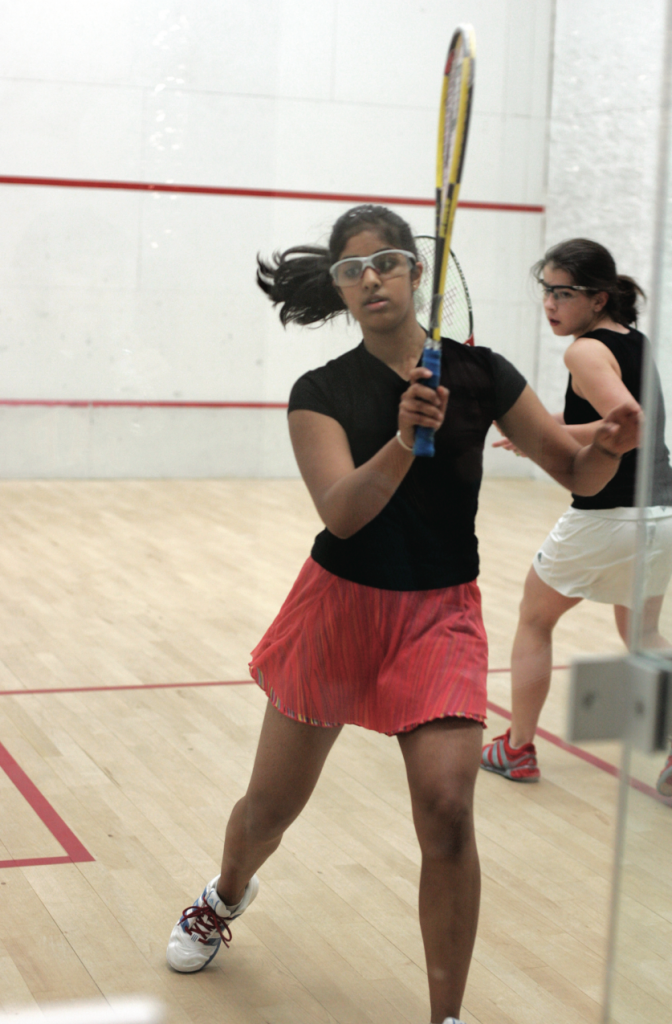
Another hometown winner was 14-year-old Vidya Rajan of Bellevue, a suburb just outside of Seattle and home to the Pro Sports Club. Rajan trains at both the Pro Sports Club and the Seattle Athletic Club, with Yusuf Khan as her coach and her father, Jayanth, as her tournament coach. Rajan played in her first US Junior Open two years ago, where after only a year and a half of playing squash—after transitioning from tennis—she made it to the finals of the U13 before losing to Olivia Blatchford.
This year Rajan dominated. She reached the finals without dropping a game, but the final was quite the commotion. After losing the first game, and winning the second, Rajan hit her opponent, Shihui Mao of Singapore, in the mouth with her racquet in the third, which caused some minor bleeding on Mao’s lip, who wears braces. After the match resumed Rajan went on to win 9-0 in the fifth. It was the second time in two weeks that Rajan had beaten Mao, the first being a 3-0 win in the semis of the Canadian Junior Open.
“I think I may have been a little too confident,” Rajan conceded. “She was hitting better length and her shots were better than when I beat her in the semis of the Canadian.” Rajan also took home that title.
Another dominant American girl was Amy Smedira. Smedira dropped just one game in the GU13—in the quarters to Maria Fernanda Martinez of Mexico. During the match, Smedira took a pretty good shot of her own from Martinez’s racquet. As a result, the match was suspended for 45 minutes while Smedira got the bleeding under control.
“Maria is a great player and was forcing me to play defensively,” Smedira said. “I eventually got myself together and pulled it out, but it was by far my hardest match of the year.”
Smedira faced fellow Ohio player Rachel Leizman in the finals, who had also dropped only one game up until then, in the semis. Seeing Smedira off-court between matches you would have had no idea that she was playing for the championship, as she and her good friend, Olivia Fiechter, who came in sixth in the GU13, were laid back and having fun. When asked about their coaching, both girls had similar responses.
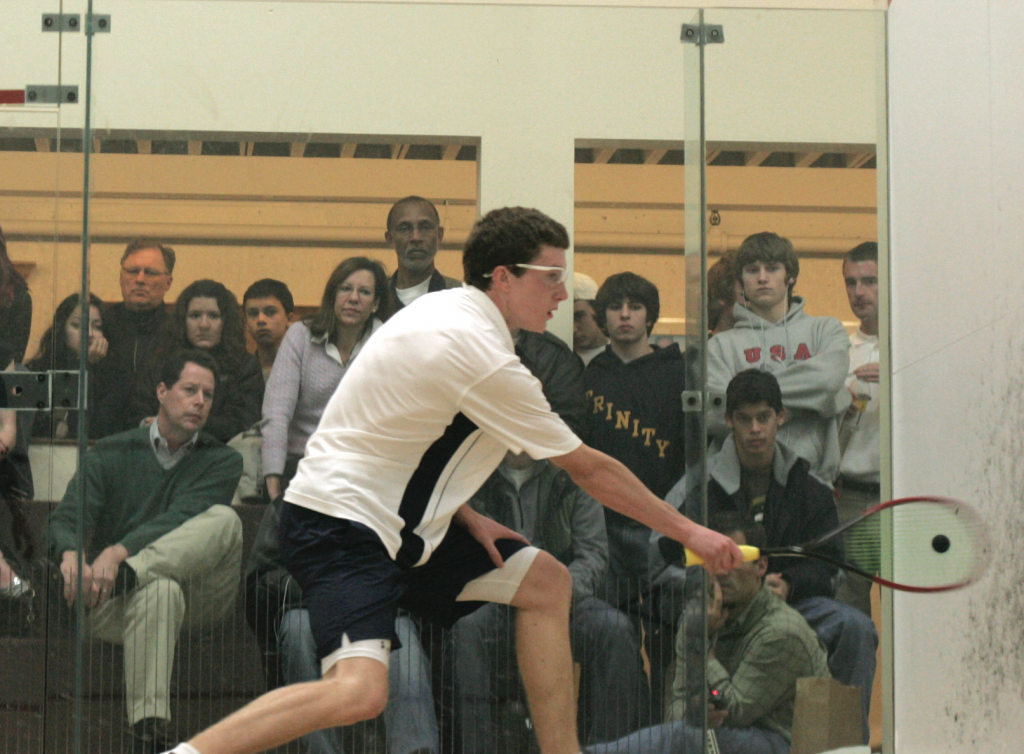
“My awesome coach is Nathan Dugan (at the Cleveland Racquet Club),” said Smedira. ”I am so happy to have him as a coach. He is great.”
Fiechter was just as enthusiastic about her coach. “Bill lane. He’s my main man.”
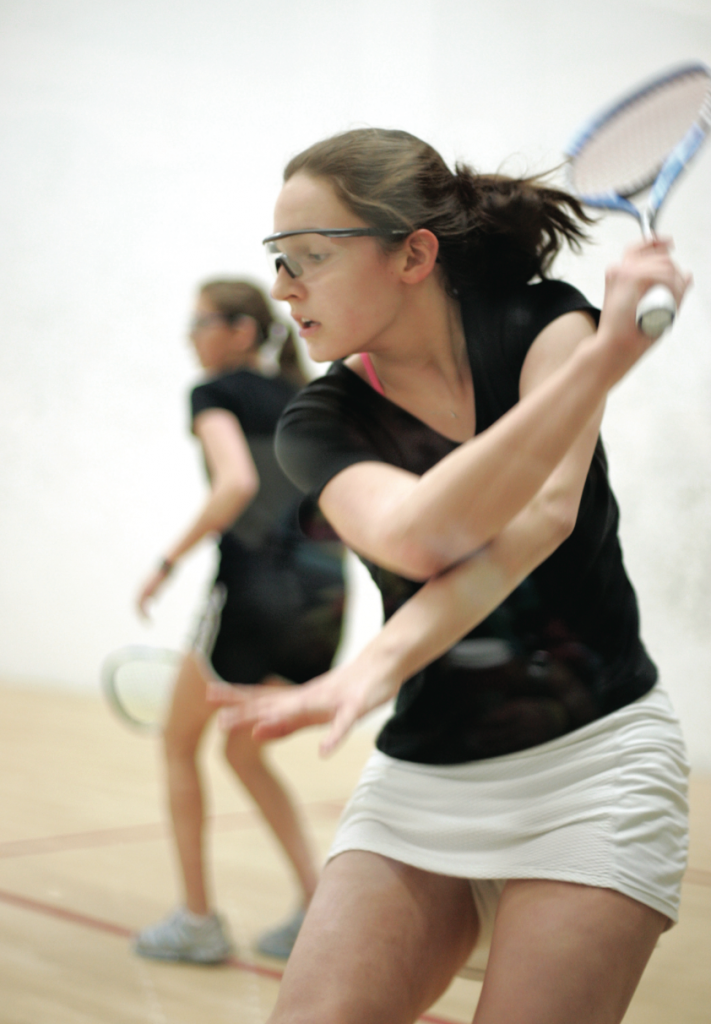
But the US girls weren’t the only ones winning home glory. The other U13 title went to Sam Conant of Philadelphia, who defeated Liam McClintock of Wellesley, MA. “He’s a great worker on court,” said Bryan Patterson, one of Conant’s coaches. “He always wants to hit the best shot—he does get a little upset if things are not going his way, and we are constantly telling him to ‘Keep cool and show no emotion on court’—he’s getting there. He certainly puts 100% effort into his work on court.”
Todd Harrity, a member of the US Junior Men’s team that played in the World Championships last fall, quietly dismantled each one of his opponents in the BU17.
“His focus and attitude were superb throughout,” said Yale assistant coach Gareth Webber upon observing Harrity. “He doesn’t do anything fancy on court, but he has good basic, solid skills with few errors and keeps the rally going. The next Julian Illingworth?”
Harrity, who has a calm off the court much like the calm he seems to maintain on court, was quietly happy after his win. At last year’s Junior Open he lost in the finals, and he said he played much better this year. “At first it was a relief,” Harrity said. “I was really glad that the tournament was over and there was time when I didn’t really have to focus anymore and I could relax. After it sunk in I was very content and happy with how I played.”
Other titles went to two Canadians—Laura Gemmell, who for the second year in a row won the Open without dropping a game (she won the GU15 in 2005), and Nicholas Sachvie, who defeated Miled Zarazua of Mexico, getting some payback for his loss to him at the Canadian Juniors.
“It felt really good because if I would have lost again, I wouldn’t forget losing to him twice,” Sachvie said. “I got my revenge.”
The BU19 final was fought out by brothers Arturo Israel Salazar Martinez and Cesar Orlando Salazar Martinez of Mexico. In an anticlimactic final and unfortunate turn of events, Cesar was forced to default due to a leg cramp, giving his brother the title.
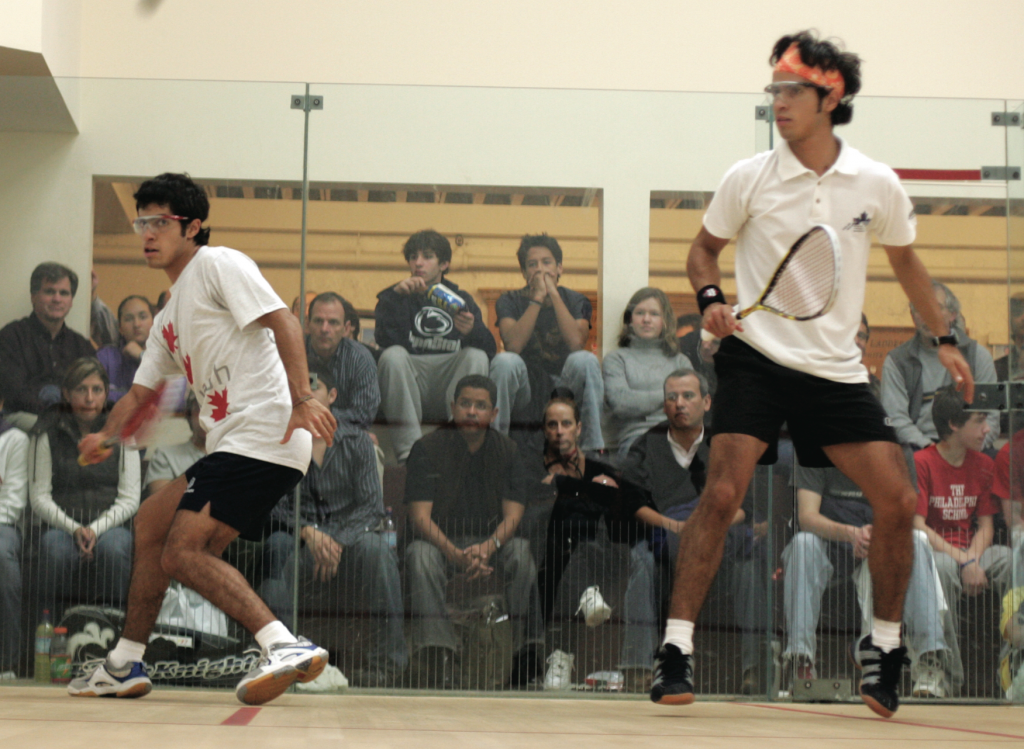
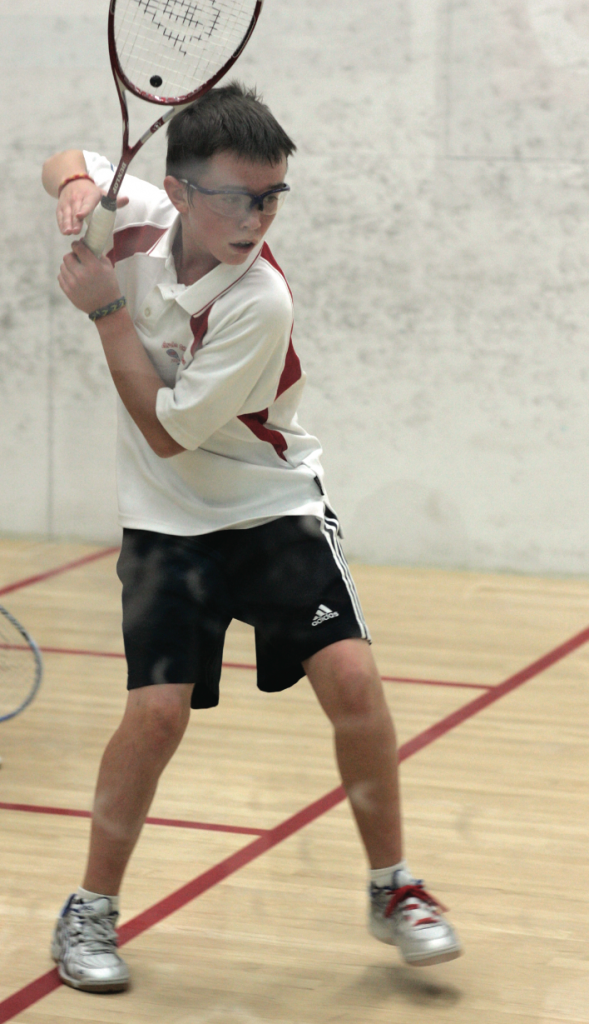 In the midst of all the excitement and disappointment (from losses) from the 263 players entered in the tournament, the event organizers were working overtime to ensure certain things—like a court for every match to be played. With all of the matches rescheduled for the Seattle Athletic Club, Vijay Chitnis, Director of National Teams, Event and Junior Squash, Suzy Schwartz, Latasha and Shabana Khan and others were making quick, difficult decisions on how to fit every match on the eight courts at the Club. This meant allotting 30 minutes for some matches and hoping that the courts would stay roughly on time. Though some courts were backed up by two hours or more on the first day, everything eventually fell into place. All credit to the Khans who, with walkie talkies in hand and an army of local volunteers, kept close tabs on the progress of every match. With not a moment to spare, as soon as one match finished the next match was ushered to the court.
In the midst of all the excitement and disappointment (from losses) from the 263 players entered in the tournament, the event organizers were working overtime to ensure certain things—like a court for every match to be played. With all of the matches rescheduled for the Seattle Athletic Club, Vijay Chitnis, Director of National Teams, Event and Junior Squash, Suzy Schwartz, Latasha and Shabana Khan and others were making quick, difficult decisions on how to fit every match on the eight courts at the Club. This meant allotting 30 minutes for some matches and hoping that the courts would stay roughly on time. Though some courts were backed up by two hours or more on the first day, everything eventually fell into place. All credit to the Khans who, with walkie talkies in hand and an army of local volunteers, kept close tabs on the progress of every match. With not a moment to spare, as soon as one match finished the next match was ushered to the court.
Despite the first day’s organized chaos, players, coaches and parents—many of whom had traveled across the country and a few from across the world—stayed calm and in good spirits. Some of them were staying in hotel rooms without power, and most struggled to find nearby restaurants that had power, all while dealing with competing in a major tournament.
A year ago, only two Americans walked away with winner’s hardware. This year, US players went home with five of the eight titles. The event had special significance for the US girls who are hoping to make the squad for the World Team Championships being played in Hong Kong this summer. One of the four national selection events for the team, it was very important for them to do well.
Jack Wyant, the US Junior Women’s Squash team coach said he was pleased with the way the American girls performed at the Open, particularly with the progress of some of them. He said that the girls have a lot of work to do in the next eight months though if they want to achieve the teams’ goals in Hong Kong in August.
So after a stormy start, the tournament that at first seemed most likely to be remembered for power outages and a major change of plans, will instead be remembered for a strong showing by the Americans and continual improvement against the international field.


